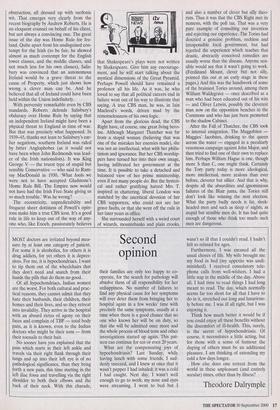Second opinion
MOST doctors are irritated beyond mea- sure by at least one category of patient. For some it is alcoholics, for others it is drug addicts, for yet others it is depres- sives. For me, it is hypochondriacs. I want to tip them out of the wheelchairs that they don't need and snatch from their hands the pills that do them no good.
Of all hypochondriacs, Indian women are the worst. For both cultural and prac- tical reasons, they cannot admit that they hate their husbands, their children, their homes and their lives, and so they retreat into invalidity. They arrive in the hospital with an absurd rictus of agony on their faces and complain of TBP — total body pain, as it is known, even to the Indian doctors who might be their sons — from their toenails to their hair.
No sooner have you explained that the pain which starts in their left ankle and travels via their right flank through their lungs and up into their left eye is of no pathological significance, than they bring forth a new pain, this time starting in the left iliac fossa and travelling via the right shoulder to both their elbows and the back of their neck. With this charade, their families are only too happy to co- operate, for the search for pathology will absolve them of all responsibility for her unhappiness. No number of failures to find any physical cause for her symptoms will ever deter them from bringing her to hospital again in a few weeks' time with precisely the same symptoms, usually at a time when there is a good chance that no one who knows her will be on duty, so that she will be admitted once more and the whole process of blood tests and other investigations started up again. This pat- tern can continue for ten or even 20 years.
What are the compensating joys of hypochondriasis? Last Sunday, while having lunch with some friends, I sud- denly sneezed, and I knew at once that it wasn't pepper I had inhaled; it was a cold I had caught. Next day, I wasn't well enough to go to work: my nose and eyes were streaming. I went to bed but I wasn't so ill that I couldn't read. I hadn't felt so relaxed for ages.
Furthermore, I was excused all the usual chores of life. My wife brought me my food in bed (my appetite was undi- minished). I received consolatory tele- phone calls from well-wishers. I had a little nap in the middle of the day. Above all, I had time to read things I had long meant to read. The day, which normally seems far too short for all that I have to do in it, stretched out long and luxurious- ly before me. I was ill all right, but I was enjoying it.
Think how much better it would be if you could enjoy all these benefits without the discomfort of ill-health. This, surely, is the secret of hypochondriasis. Of course, it necessitates a little acting, but for those with a sense of humour the duping of others must be an additional pleasure. I am thinking of extending my cold a few days longer.
How else does one retreat from the world in these unpleasant (and entirely secular) times, other than by illness?
Theodore Dalrymple


























































































 Previous page
Previous page